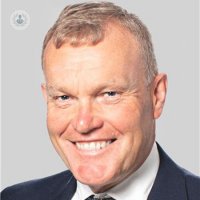ACL injuries: What you need to know
Written by:In his latest online article, Dr Philip Batty gives us his insights into ACL injuries. He talks about how they occur, the signs and symptoms, the difference between ACL tear and ACL sprain, if surgery is always needed, how long it takes to heal and could patients retear their ACL.

How do ACL injuries occur?
Primarily, these incidents typically happen when an individual is loading their knee and loses control. This can occur due to a forceful impact or being struck, causing the knee to turn inward and twist into what we refer to as a knee valgus position. These incidents are most commonly associated with situations involving this particular movement, as it is during such moments that the ACL is particularly susceptible to injury.
What are the signs and symptoms of ACL injuries?
Often, individuals may mention experiencing discomfort, although it's not a consistent symptom. They might sense an unsteady moment and feel as if something has given way. Some may recall hearing a popping sound. Swelling is a potential indicator, and it could manifest promptly or gradually over a few hours.
Pain may accompany the swelling, but in certain instances, the occurrence might not be immediately apparent to individuals, and they may not be fully conscious that it has taken place.
What is the difference between an ACL tear and an ACL sprain?
Based on that, I would infer that an ACL tear involves a complete rupture, rendering the ACL non-functional. However, there are also less severe sprains that can occur.
These minor sprains typically develop gradually and may have a more degenerative nature. Individuals might notice a slight loss of control or experience stability issues with the knee.
Is surgery always needed to treat ACL injuries?
Surgery isn't always necessary for treating ACL injuries, as many individuals lead active lives without undergoing surgical intervention. There's even a case report of a Premier League footballer who continued playing without an ACL.
While some people manage well without an ACL, others may face challenges. Regardless, whether dealing with an ACL-deficient knee or undergoing ACL reconstruction surgery, the crucial focus is on restoring and enhancing strength, particularly in the leg muscles. Muscles play a primary role in providing stability to the knee. Issues arise when muscles are weak or imbalanced. The goal is to minimise the reliance on ligaments by ensuring that the muscles influencing the knee are robust.
How long do ACL injuries usually take to heal?
ACL injuries typically do not undergo spontaneous healing. The restoration of knee function varies. Opting for a non-surgical approach allows individuals to resume most activities within two to three months, as seen in the case of the previously mentioned Premier League footballer. However, if surgery is chosen, the recovery period is more substantial. Achieving full functionality usually takes about nine to twelve months, with ongoing improvement thereafter. By the 12-month mark, one can generally expect a recovery of 95% or more. Premier League footballers who undergo surgery often return around the nine-month mark, benefiting from intensive collaboration with expert medical teams.
Could patients retear their treated ACLs?
We are currently examining data related to this issue, and findings vary among surgeons, contingent on their reports and the age of the patients. Retear rates can be around 30%, especially in the younger age group. Therefore, there is a pressing need to intensify efforts in preventing the recurrence of ACL injuries.
Dr Philip Batty is an esteemed consultant in sport and exercise medicine with over 35 years of experience. You can schedule an appointment with Dr Batty on his Top Doctors profile.



